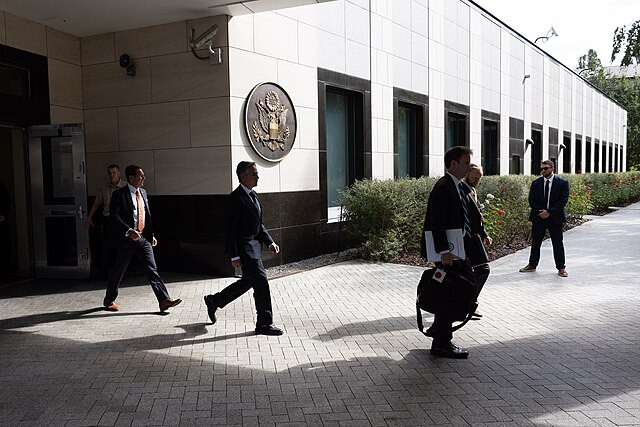The U.S. Embassy in Kyiv temporarily closed on Wednesday, citing "specific information of a potential significant air attack," as tensions between Ukraine and Russia escalate in the wake of Kyiv's first use of U.S.-supplied long-range missiles on Russian territory. The move underscores the growing intensity of the conflict, now in its 1,000th day.
The embassy urged American citizens to remain vigilant and be prepared to shelter in place if air alerts are announced. "Out of an abundance of caution, the Embassy will be closed, and Embassy employees are being instructed to shelter in place," read a security alert issued by the mission.
This closure follows a Ukrainian strike on Russia's Bryansk region on Tuesday using Army Tactical Missile System (ATACMS) missiles, which were approved for use by President Joe Biden. The attack marked the first time Kyiv has deployed such long-range weaponry on Russian soil, a decision that has drawn fierce condemnation from Moscow.
Kremlin spokesperson Dmitry Peskov accused the U.S. of fueling the conflict. "The outgoing U.S. administration is fully determined to prolong the war in Ukraine," Peskov told journalists on Wednesday. Moscow has also updated its nuclear doctrine, with President Vladimir Putin lowering the threshold for nuclear retaliation, stating that a conventional attack by a non-nuclear state supported by a nuclear-armed nation could warrant a nuclear response.
The embassy's closure, however, was not directly linked to the nuclear threat, according to a spokesperson. Instead, it was attributed to the "ongoing threats of air attacks" as Russian forces intensified aerial strikes across Ukraine. Overnight, Russia launched approximately 122 drones targeting Kyiv and other regions, the Ukrainian air force reported, adding that 56 of the drones were intercepted. Additional guided missiles struck the Dnipro, Chernihiv, and Sumy regions, causing casualties and significant damage.
In Kyiv, drone debris sparked a fire in a multi-story apartment building, while other strikes damaged a kindergarten and residential areas, according to Serhii Popko, head of Kyiv's City Military Administration. He described the attacks as among the largest in recent months. Ukrainian Minister of Internal Affairs Ihor Klymenko confirmed eight deaths and dozens of injuries from a missile strike in Sumy, which forced the evacuation of over 400 residents from a nine-story building.
The Biden administration's approval for Ukraine to use Western-provided long-range missiles has emboldened Kyiv but drawn warnings from Moscow. In response to the strikes, Putin emphasized that such actions bring the U.S. and NATO closer to direct involvement in the war. The decision also drew criticism from allies of President-elect Donald Trump, who has pledged to end the war within a day of taking office.
The conflict has extended beyond Ukraine's borders. Ukrainian forces reportedly continue to hold positions in Russia's Kursk region after an incursion in August. Additionally, Ukraine is said to have struck a Russian command post in the Belgorod border region this week. Meanwhile, Russian state media reported intercepting Ukrainian drones attempting further strikes on Russian territory.
Amid the escalating violence, the U.S. has also announced the provision of antipersonnel land mines to Ukraine, designed to impede Russian ground forces. These mines, described as "non-persistent" with a timed inert function, have sparked criticism from humanitarian organizations. The International Campaign to Ban Landmines called the decision "inconceivable," urging the Biden administration to reconsider.
In Washington, the Pentagon downplayed Russia's updated nuclear doctrine, calling it "irresponsible rhetoric" consistent with past escalatory statements. "We don't have any indications that Russia is preparing to use a nuclear weapon within Ukraine," Pentagon Deputy Press Secretary Sabrina Singh said.
As Ukrainian strikes increase, Kyiv insists that such actions are necessary to repel Russian aggression. "Anyone asking Ukrainians if they're afraid of Putin escalating clearly hasn't woken up to the sound of hypersonic missiles exploding over their cities," Ukrainian parliament member Inna Sovsun remarked on social media.




